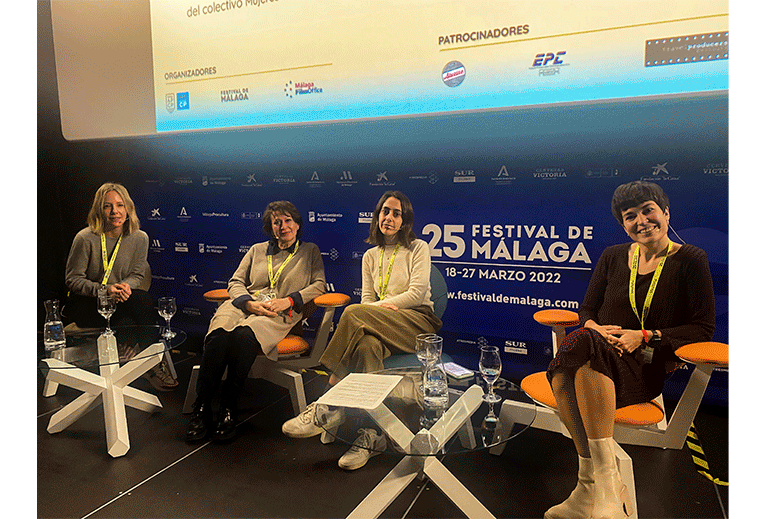
The third table, which has become indispensable at the Malaga conference, is the table dedicated to women in the industry.
Montse Ogalla, Producer and production manager. Av2Media Films/SchoolTraining. Member of the Mujeres en V.O. collective, she was in charge of presenting the round table “Mujeres que dejan huella” (Women who leave their mark).
The participants were: Concha Wert, journalist and director of c de c until last October, Ana Méndez Márquez, co-founder of Mrs. Greenfilm and Inés Segura, executive producer of Primo and in the role of moderator Luna Esquerdo, founder of Bambina.
This panel discussion was opened by looking at some graphs showing how clearly there is a gap between women and men in senior positions.
The speakers answered the question of whether being a woman has made it difficult for them to get to where they are.
Inés Segura spoke of sacrifice rather than difficulty, the difference being motherhood. She personally has never found herself in this situation and cleared that it does not always happen.
Concha Wert, reflected on how women have felt an inferiority complex for years. She herself felt this in her early days and it took her a long time to realise this exclusion. She explained that in other sectors I do not notice this inequality and much less so when I work in advertising, although she personally has seen that this does happen and that it is gradually changing.
They all agreed that it is a cultural and educational problem. There is a large part of women who have inherited a kind of guilt and that has to be left behind, not only women but the whole society.
Is reconciliation really viable given the demands of the sector?
The difficulty lies in getting all parties involved to pull in the same direction.
Ana Menéndez, explained that we are in a green revolution within the industry, but that we must also aim for a social revolution.
Mrs Greenfilms works with production companies to achieve social benefits, in fiction production companies some changes and conciliation spaces are already being implemented.
In advertising it seems to be more complicated, but Ana points out that it is not impossible. It is important to go hand in hand with the administrations in this situation, to reward those production companies that are committed to these changes for the benefit of personal reconciliation.
Primo’s executive producer saw this option in advertising a little differently, she does not believe that the working days will be reduced, because in many projects it is unfeasible because there are 2 or 3 days of filming on average.
Regarding whether the positions are gendered, the general response was that we are seeing a change. There are already women in all departments, but there is still a long way to go.
They agreed on the importance of generational change. There are many limitations that have been imposed and that is already changing. There is no profession in which women feel they cannot access, in positions it is different, it will take more time, but it will happen.
Are we going too far with positive discrimination?
On one hand, we have been suffering this discrimination for many years just because we receive this type of aid for a little longer, nothing happens. But on many occasions it is true that injustice can be generated.
Sometimes it seems that favouring equality favours inequality. Any action or measure that is put in place to solve this problem is there to help, obviously we have to think of these actions as something temporary and that the time will come when they are no longer necessary.
They emphasised that the data and the situation of women is improving, but there is still a long way to go and if imposing certain actions in favour of parity in the workplace is the best way then that is fine.
They concluded by reflecting on why it is important to have these kinds of debates, as it is a way of educating for change and raising awareness. Among the audience there were many students who participated and expressed that they had found it very motivating to listen to these great professionals in the sector.



